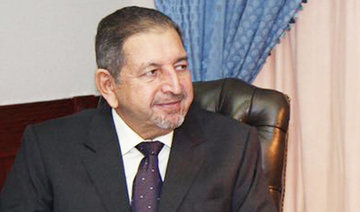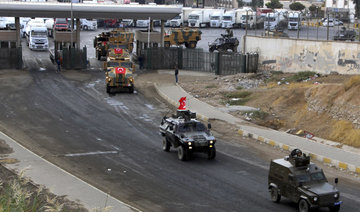Al-Qaim: The US-led coalition’s newest outpost in the fight against Daesh is in a dusty corner of western Iraq near the border with Syria. Here, several hundred American Marines operate close to the battlefront, a key factor in the recent series of swift victories against the extremists.
The Americans directed Iraqi troops in their victory last week recapturing the nearby border town of Al-Qaim, the militants’ last urban holding. Now the Marines will lead the equally difficult task of clearing the extremists from their last redoubt: A large stretch of empty desert north of the Euphrates River adjoining the border with Syria.
They also face the possibility of friction with Iranian-backed Iraqi militias that are increasing their own presence in the border region.
Under a plastic tent, the Marines run an austere joint command center about 20 km from the border. A dozen monitors relay surveillance footage and troop positions in the town of Al-Qaim nearby. Using racks of radio and satellite equipment, the coalition forces and Iraqi officers at the base pass information between forces on the ground and Al-Asad Air Base, the coalition’s main base in Anbar province some 130 km to the east.
Such outposts have become more common the past year, bringing the Americans out of main bases and closer to the action. US commanders say the tactic has paid off in the swift rollback of Daesh.
The capture of Al-Qaim completed the sweep driving Daesh from major towns along the Euphrates Valley in Iraq. Along the river on the Syrian side, Syrian regime forces took the city of Deir Ezzor last week.
All that remains from the so-called “caliphate” that once stretched from northwest Syria to the edges of Baghdad are a small stretch of villages on the Euphrates in Syria and the enclave of desert straddling the border into both Syria and Iraq.
US Marines Col. Seth W. B. Folsom, commander of Task Force Lion, oversaw the Al-Qaim fight and said he expects clearing and holding the retaken territory in Anbar to be more difficult than the assault itself.
“It’s much more challenging, no doubt in my mind it’s more challenging,” he said. Motivating troops to attack to regain their country is easy, he said. “What’s less easy to motivate men to do, is to stand duty at checkpoints.”
Much of Anbar and Iraq’s border with Syria has been beyond central control for decades. The deserts there have served as havens for smugglers for generations.
Iraqi forces are stretched thin. Many are deployed in support of local police in liberated towns and cities and along major roadways. Others have been diverted to the borders of the Kurdish region amid the military standoff between Baghdad and Kurdish forces.
Iraq’s Popular Mobilization Units (PMU) have also built up their presence along Iraq’s border with Syria.
They make no attempt to hide that they are working to physically extend the influence of US rival Iran. Jaafar Al-Husseini, a spokesman for the Hezbollah Brigades, a group under the PMF, boasted during the Al-Qaim fighting that the forces are securing a route from “Iran to Beirut.”
“We have foiled the American project in Iraq and on the Syrian borders, and we have succeeded in securing the road that links Iran, Iraq, Syria and Lebanon,” he told The Associated Press.
Coalition forces do not directly coordinate with the PMU, but rely on the Iraqi military to relay their movements to avoid striking the fighters.
US Marines Maj. Greg Duesterhaus said the PMU presence complicates things but is not a great concern. “They are part of the forces that are out there on the battlefield,” he said.
The growing numbers of coalition troops are stretching the capacity of Anbar’s bases. Notices warning of water shortages hang in bathrooms and showers at Al-Asad. At Al-Qaim, Marines ration water.
“Anbar is the far reaches of Iraq,” said Col. Folsom. “The challenge that we’ve got here that they have not had as much up in the north is really just the tyranny of distance.”
Daily convoys leave from Al-Asad to the Al-Qaim outpost carrying water, food, ammunition and building supplies. They travel along desert roads for a tedious seven-hour journey. Storms whip up powder-fine sand, reducing visibility and halting traffic for hours. Lack of Iraqi military escorts sometimes leaves convoys stuck for hours.
Without electricity, cell phone service or the Internet, Marines at the Al-Qaim outpost pass the evening hours smoking cigarettes and talking.
Sitting between an armored vehicle and the rubble of a partially collapsed building, a group of Marines and soldiers joked about camp conditions and the monotony of their field rations. They also reflected on their mission in Iraq with a mix of sobriety and cynical humor.
They may feel a sense of accomplishment in the gains against Daesh — “but it’s not a sense of finality,” one Marine staff sergeant said. He served in Anbar in 2007, unlike most of his comrades, who are on their first deployment to Iraq. He never thought he’d be back, but now believes there will be a US presence in Iraq for generations to come.
“When my son joins the Marines, he’ll probably be deployed to Iraq,” he said with a laugh. He spoke on condition that he only be identified by his rank in line with regulations.
Col. Folsom said he hoped within the next year Iraqi forces would be able to hold the western edge of Anbar on their own and coalition forces can fall back to Al-Asad air base.
“We have to find some sort of sustainable presence,” he said. “What that will look like, I don’t know. There may still be some commuting to work in one way or another.”
As caliphate crumbles, US builds outposts in western Iraq
As caliphate crumbles, US builds outposts in western Iraq

Russia says Israel attacks on Iran are illegal, notes Iran’s commitement to NPT

- The statement said Moscow was waiting for the International Atomic Energy Agency to provide “unvarnished” assessments of the damage caused to Iranian nuclear facilities by Israeli attacks
MOSCOW: Russia’s Foreign Ministry on Tuesday denounced continued Israeli attacks on Iran as illegal and said a solution to the conflict over Tehran’s nuclear program could only be found through diplomacy.
A ministry statement posted on Telegram noted Iran’s “clear statements” on its commitment to adhere to the nuclear non-proliferation treaty and its willingness to meet with US representatives.
The statement also said Moscow was waiting for the International Atomic Energy Agency to provide “unvarnished” assessments of the damage caused to Iranian nuclear facilities by Israeli attacks.
Qatari emir and Turkish president discuss Israeli attacks on Iran

- Sheikh Tamim bin Hamad Al-Thani and Recep Tayyip Erdogan emphasize important need to deescalate conflict and find diplomatic solutions
LONDON: Sheikh Tamim bin Hamad Al-Thani, the Emir of Qatar, and Turkish President Recep Tayyip Erdogan on Tuesday discussed Israel’s ongoing attacks on Iran, which began on Friday and have targeted nuclear sites, military leaders, intelligence chiefs and atomic scientists.
During their call, the leaders emphasized the important need to deescalate the conflict and find diplomatic solutions, the Qatar News Agency reported.
Earlier in the day, the Qatari minister of state for foreign affairs, Mohammed Al-Khulaifi, warned during a call with Rafael Grossi, the director general of the International Atomic Energy Agency, that the targeting of Iranian nuclear facilities by Israel represented a serious threat to regional and international security.
The IAEA reported on Monday that an Israeli airstrike on Iran’s Natanz Nuclear Facility on Friday had damaged centrifuges at the underground uranium-enrichment plant, raising concerns about possible radiological and chemical contamination in the area.
Qatari minister of state, IAEA chief discuss ‘serious threat’ of Israeli strikes on Iran’s nuclear sites

- Mohammed bin Abdulaziz Al-Khulaifi reiterates Qatar’s condemnation of attacks on Iranian territory
- He said targeting nuclear facilities threatens regional, international security
LONDON: The Qatari Minister of State for Foreign Affairs Mohammed bin Abdulaziz Al-Khulaifi on Tuesday discussed the conflict between Israel and Iran with Rafael Grossi, the director general of the International Atomic Energy Agency.
Al-Khulaifi discussed in a call the Israeli attacks on Iranian nuclear facilities that began on Friday, targeting the Natanz, Fordo, and Isfahan nuclear sites.
Al-Khulaifi stressed that targeting nuclear facilities was a serious threat to regional and international security. He reaffirmed Qatar’s commitment to dialogue to resolve conflicts and achieve peace in the region.
The officials discussed ways to improve the security of nuclear facilities and ensure they are safeguarded against threats, the Qatar News Agency reported.
Al-Khulaifi reiterated Qatar’s strong condemnation of the Israeli attacks on Iranian territory, deeming them blatant violations of Iran’s sovereignty and security, the QNA added.
The IAEA reported on Monday that the Israeli airstrike on Iran’s Natanz facility on Friday damaged the centrifuges of the underground uranium enrichment plant, raising concerns about potential radiological and chemical contamination in the area.
US pulls out of two more bases in Syria, worrying Kurdish forces

- The SDF did not respond to questions about the current number of troops and open US bases in northeastern Syria
AL-SHADADI BASE: US forces have pulled out of two more bases in northeastern Syria, visiting reporters found, accelerating a troop drawdown that the commander of US-backed Syrian Kurdish forces said was allowing a resurgence of Daesh.
The reporters who visited the two bases in the past week found them mostly deserted, both guarded by small contingents of the Syrian Democratic Forces — the Kurdish-led military group that Washington has backed in the fight against Daesh for a decade.
Cameras used on bases occupied by the US-led military coalition had been taken down, and razor wire on the outer perimeters had begun to sag.
A Kurdish politician who lives on one base said there were no longer US troops there. SDF guards at the second base said troops had left recently but refused to say when.
HIGHLIGHTS
• No US troops present at Al-Wazir and Tel Baydar bases.
• Daesh threat ‘has significantly increased’, SDF commander says.
The Pentagon refused to comment.
It is the first confirmation on the ground by reporters that the US has withdrawn from Al-Wazir and Tel Baydar bases in Hasaka province.
It brings to at least four the number of bases in Syria US troops have left since President Donald Trump took office.
Trump’s administration said this month it will scale down its military presence in Syria to one base from eight in parts of northeastern Syria that the SDF controls.
The New York Times reported in April that troops might be reduced from 2,000 to 500 in the drawdown.
The SDF did not respond to questions about the current number of troops and open US bases in northeastern Syria.
But SDF commander Mazloum Abdi, who spoke at another US base, Al-Shadadi, said the presence of a few hundred troops on one base would be “not enough” to contain the threat of Daesh.
“The threat of Daesh has significantly increased recently. But this is the US military’s plan. We’ve known about it for a long time ... and we’re working with them to make sure there are no gaps and we can maintain pressure on Daesh State,” he said.
Abdi spoke on Friday, hours after Israel launched its air war on Iran. He refused to comment on how the new Israel-Iran war would affect Syria, saying simply that he hoped it would not spill over there and that he felt safe on a US base.
Hours after the interview, three Iranian-made missiles targeted the Al-Shadadi base and were shot down by US defense systems, two SDF security sources said.
Daesh ruled vast swathes of Iraq and Syria from 2014 to 2017 during Syria’s civil war.




















